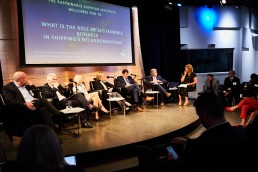Shipping emits 2-3% of carbon emissions, yet there is only one maritime event in the Climate Week programme. It’s sold out.
NEW YORK, 25 September 2019 – The Sustainable Shipping Initiative (SSI) is hosting an event today at Climate Week NYC, debating the role of sustainable biofuels in the transition to zero-emission shipping in front
of a full house.
Moderated by Dr. Sally Uren, Chief Executive of the sustainability non-profit Forum for the Future, the event will see a panel of leaders across and beyond the shipping value chain sharing their perspectives, including:
- Manuel Pulgar Vidal, Leader of Climate & Energy Practice, WWF (former Environment Minister of Peru and COP20 President)
- Gerard Ostheimer, Managing Director below50, World Business Council for Sustainable Development
- Christine Weydig, Director, Office of Environmental and Energy Programs, Port Authority of New York and New Jersey
- Kirsi Tikka, Independent Non-Executive Director
- Adair Turner, Chair, Energy Transitions Commission
- John Kornerup Bang, Chief Climate Change Advisor, Maersk
There is an urgent need for the radical decarbonisation of shipping. It is time for the maritime industry to play its part in limiting global warming to 1.5°C, by transitioning from the current reliance on fossil fuels towards zero carbon fuels by 2050. Currently virtually all 50,000 or so merchant ships burn heavy fuel oil or liquid natural gas and that creates around 2-3% of global carbon emissions.
In 2018, SSI-commissioned research by Lloyds Register and UMAS, which revealed that zero-emission vessels need to be entering the world’s fleet by 2030 – and that advanced biofuels represent one of the more economically feasible options in the short, medium and perhaps long term, amongst a possible range of low/zero carbon fuels for the shipping industry. However, shipping is not alone in looking to biofuels: they are also receiving attention from the aviation sector as a path to decarbonisation.
John Kornerup Bang, Chief Climate Change Advisor at Maersk says: “In 2018 Maersk announced its goal to reach carbon neutrality by 2050, a bold ambition that requires that we have carbon neutral and commercially viable vessels in operation by 2030. We’re engaging in an open dialogue with a range of different actors, across the value chain, as we explore all options – including biofuels. SSI’s event at Climate Week is an opportunity for us to share our recent experience trialling biofuels as well as learn from our peers and partners across the maritime, climate, energy and sustainability communities to continue our journey towards net zero by 2050.”
Dr Sally Uren, Chief Executive at Forum for the Future, says: “It has never been more urgent for the shipping sector to move away from fossil fuels, and – while there are no silver bullets – it is clear that the risks of ‘doing nothing’ are simply too great. Our climate can’t wait, and neither can actors across the shipping value chain who need to make critical investment decisions today. The role of biofuels in the sector’s decarbonisation needs to be set out, and we need cross sectoral collaboration across the maritime, energy, climate and sustainability communities if we are to avoid a host of unintended consequences.”
Nick Brown, Marine and Offshore Director at Lloyd’s Register says: “To meet the International Maritime Organization’s 2050 Greenhouse Gas (GHG) ambitions, zero-emission vessels (ZEVs) must be entering the world fleet by 2030 and Lloyd’s Register has been assessing biofuels as part of its ZEV transition pathways. Sustainability and availability of biofuels in sufficient quantities for shipping are two key factors that will determine their role in decarbonising the maritime industry and Lloyd’s Register welcomes this deep dive to better understand their potential.”
Andrew Stephens, Executive Director at SSI says: “We’re delighted to bring some critical voices to the conversation on zero-emission shipping at Climate Week. Getting to zero by 2050 is a bold ambition but it is possible. Shipping needs to kickstart its energy transition now, and for that to happen we need to explore all the sustainable options that can get us there. Our panel will unpack the issues surrounding the use biofuels in shipping – alongside other non-fossil fuels and technologies such as ammonia, hydrogen and batteries. There are more questions than answers, but what remains clear is that investors, shipowners and ship builders, ports and fuel suppliers need to know in which infrastructure they should start investing.”
Throughout 2019 SSI has been engaging closely with key players on an inquiry to explore the issues at play surrounding the sustainability and availability of biofuels for shipping in the context of the maritime industry’s transition to zero-emission shipping. SSI’s event at Climate Week represents the culmination of this multisectoral debate, galvanising stakeholders across and beyond the shipping value chain. Following Climate Week SSI will publish a report reflecting the complete findings of the inquiry led by Forum for the Future. The report will be launched on 15 November 2019 at the Intersessional Working Group on Reduction of GHG Emissions from Ships at the International Maritime Organization in London.
Climate Week is a unique opportunity for the growing sustainable shipping community – comprising maritime and non-maritime stakeholders – to take climate action to fulfil the commitments laid out in the Paris Agreement. We must see the rapid and full decarbonisation of all our global systems – including shipping.
More information on SSI’s Climate Week event What is the role of sustainable biofuels in shipping’s decarbonisation? is available here.
The complete findings of SSI’s inquiry will be published in November on the SSI website.

